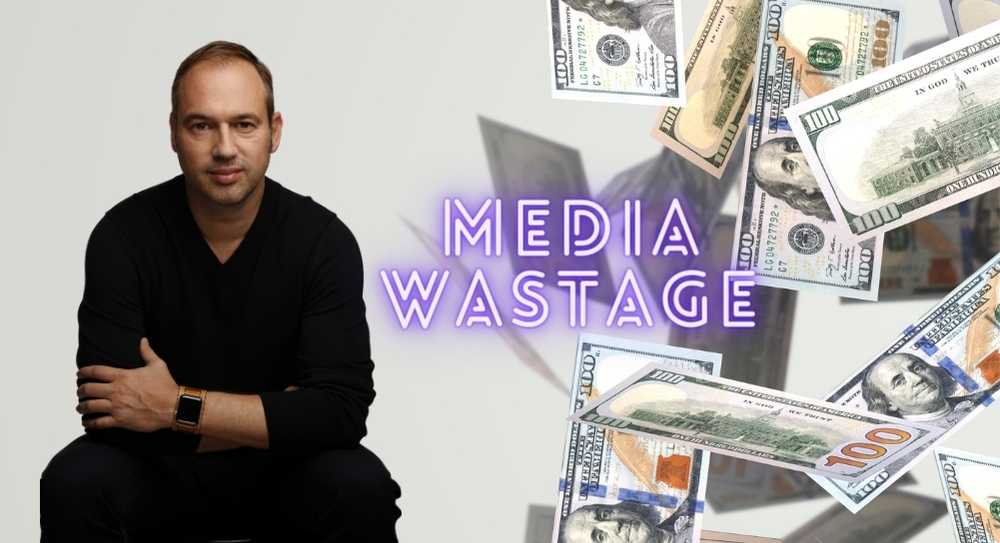The advertising world can often feel like a challenging and complex landscape. In the past, advertisers held a position of power, but now they face unfamiliar challenges, such as rising ad costs and a fragmented media landscape. It is the smaller players, known as Challenger Brands, that are particularly impacted by these issues.
Ad Wastage, the Hidden Villain
Part of the challenge with advertising is the concept of "ad wastage". But what exactly is ad wastage? It refers to the money that goes down the drain when advertising efforts fail to generate returns. This can happen when the wrong audience is targeted, when the wrong media platforms are used, or even when ad fraud occurs.
For example, picture a luxury car brand accidentally targeting their ads at teenagers – it's like trying to sell a surfboard to a penguin. Or consider those display ads that are tucked away at the bottom of a webpage, rarely seen and hardly clicked. These are classic examples of ad wastage – spending money on ads that simply don't do their job.
Key Causes of Ad Media Wastage
Ad media wastage occurs due to several reasons, and understanding these causes is crucial for advertisers to minimize their ad spend and maximize their return on investment. The following are some key factors that contribute to ad media wastage:
1. Poor Targeting: When advertisers do not have a clear understanding of their target audience, they may end up showing their ads to people who have no interest in their products or services. This results in wasted ad spend and low ROI. Effective targeting involves conducting thorough market research, defining buyer personas, and segmenting the target audience based on demographics, interests, and behaviour.
2. Incorrect Media Mix: Using the wrong platforms or media channels for a particular audience can lead to ad wastage. For example, advertising on a platform mainly used by teenagers when the target audience is middle-aged adults would not yield good results. Media agencies must utilize all available research to conduct a thorough analysis of media consumption as part of their overall media strategies. This analysis allows advertisers to gain a clear understanding of the media channels that their target audience is engaging with. Armed with this knowledge, advertisers can then carefully select the media channels that best align with their target audience's preferences and habits.
3. Poor Timing: If the timing of the ad is not aligned with the consumers' behavior, it can result in wastage. For instance, promoting an ad for breakfast products at midnight would not be effective.
4. Ad Fraud: The presence of fraudulent activities in digital advertising, such as bot traffic or dishonest publishers not delivering promised impressions or clicks, contributes significantly to ad media wastage. Advertisers should work with reputable ad networks and regularly monitor their campaigns for any suspicious activity.
5. Lack of Tracking and Optimization: If advertisers are not tracking the performance of their ads and adjusting the strategy accordingly, they could be wasting money on ineffective tactics. Ad campaigns require constant monitoring and optimization to ensure they are reaching the right audience, generating desired outcomes, and maximizing ROI.
6. Non-viewable Impressions: In digital advertising, sometimes ads are not actually seen by users. This could be due to ad-blocking tools, ads being placed "below the fold" (meaning you have to scroll down to see them), or ads that load too slowly. Advertisers should prioritize viewability and work with publishers who provide transparent reporting on ad viewability metrics.
7. Lack of Media Transparency: Unresolved issues like Agency Volume Benefits (AVBs) and Unbilled Media can cause media wastage. Advertisers may end up paying for media value they did not fully receive or understand, resulting in inefficient ad spend. It is essential for advertisers to have transparent agreements with their media agencies and regularly review their media buying practices.
8. Media Agency Accountability Issues: Agencies may fail to deliver on expectations and commitments made during their pitches. The use of Performance-Related Fee (PRF) contracts can help ensure that agencies are held accountable and meet their commitments to their clients. Regular performance evaluations and open communication with agencies can also help address any accountability issues.
9. Uncompetitive Media Pricing: If the media pricing is not competitive, advertisers could be overpaying for their ad space, leading to unnecessary wastage. This is why it is essential to have a clear understanding of market rates and negotiate effectively. Advertisers should explore different media buying options and consider working with media buying experts who can help them secure the best deals.
By addressing these key causes of ad media wastage, advertisers can optimize their ad campaigns, reduce costs, and improve their overall advertising effectiveness. With careful planning, strategic targeting, and continuous analysis, advertisers can minimize ad wastage and achieve better results from their advertising investments.
Minimising Ad Wastage: The Game Plan
So how can you fight back against rising costs and ad wastage? Here are some weapons in your arsenal:
Get Strategic with Planning & Research
The key is to know your target audience. To truly understand your audience, it's essential to delve deep into their preferences, dislikes, and needs. This valuable insight will enable you to craft compelling ads that resonate with your target market. By conducting thorough research and gathering data, you can uncover the key nuggets of knowledge that will help your ads strike a chord with your audience.
Start by identifying the demographics of your target audience, such as age, gender, location, and interests. This information will provide a solid foundation for understanding their likes and dislikes. Additionally, conducting surveys or focus groups can give you direct insights into their needs and desires.
Once you have a clear understanding of your audience, use this knowledge to create ads that speak directly to their interests and preferences. Tailor your messaging, visuals, and tone to align with what resonates with your target market. By doing so, you'll be able to capture their attention and stand out from the competition.
Pick the Right Platform & Format
Instead of blindly trusting your media agency's media mix recommendation, insist on receiving a thorough analysis of your target audience's media consumption. Only then can you have confidence that the suggested media mix aligns with your target audience's preferences.
If it falls short, don't hesitate to push back and request an improved version of their media strategy. By making informed choices about your platform selection, you can ensure that your advertising budget is effectively utilized.
Optimise Ad Timing
To address the issue of poor ad timing, advertisers need to adopt a data-driven approach. By understanding their audience's habits and behaviours, they can determine optimal times for ad placements. This includes knowing when the audience is most likely to be active online and when they're most receptive to specific types of content.
Moreover, use dynamic ad scheduling features provided by many digital advertising platforms. These tools automatically show your ads at times when they're likely to perform best, based on past data. As part of this, split-testing different ad timings can help identify what works best and optimize campaigns further. Remember, effective advertising is not just about reaching the right audience, but also engaging them at the right time.
Tackle Ad Fraud Head On
Ad Fraud is a significant and concerning issue in the advertising industry, leading to a wastage of ad spend. It is crucial for advertisers to be aware of the reality and not assume that it doesn't affect them. Extensive research has proven the existence of Ad Fraud, especially in Programmatic advertising and on platforms like YouTube.
To minimize ad fraud, advertisers should invest in ad fraud tracking capabilities. It is essential to have internal processes in place to safeguard against fraud. Spending large sums of money on digital media without these safeguards is irresponsible and indicates a lack of competence. Take this warning seriously and take the necessary steps to protect your advertising investments.
Use Advanced Analytics
In this era of data-driven advertising, leveraging real-time media performance insights can be a game-changer. By utilizing tools that provide valuable data and analytics, advertisers can fine-tune their ad strategies on the go. This ensures that their ads are performing optimally, minimizing wastage and maximizing effectiveness.
One powerful tool in this regard is Media Performance Tracking. This comprehensive solution collects, processes, and presents advertising media data to deliver actionable insights on a brand's media performance. With access to these insights, advertisers can quickly identify any potential issues and take corrective actions in a timely manner. This not only helps in minimizing ad wastage but also maximizes the overall effectiveness of their advertising campaigns.
Ensure High Viewability for Digital Display Campaigns
If you are investing in digital display ads, it's crucial to track viewability to ensure that your impressions are not only served but also seen. When you purchase TV ads, you only pay when your ads have been seen, as the buying model in most markets is based on the cost per GRP. So why should it be any different for digital media? It's unreasonable to pay for ads that haven't been seen. Unfortunately, many advertisers still do, which is not ideal.
Therefore, it is important to track viewability from the start and establish a clear definition of what constitutes viewability with your agency. Some may consider 50% of an ad seen for one second to be sufficient, but a better definition would be 75% of an ad seen for at least 3 seconds. Once you have set the definition of viewability and implemented the necessary tracking, it's essential to set targets or Key Performance Indicators (KPIs) for viewability. For example, you could aim for 80% of your ads to be seen. By only paying for ads that you are confident have been seen by your target audience, you can minimize wastage and make the most of your advertising budget.
Address Media Transparency in your Media Agency Contract
Media transparency should be prioritized from the beginning, starting with your media agency contract. It is crucial to address this issue correctly in your contract to avoid wasting valuable ad money. Having full transparency in the media supply chain is essential to assess if any mark-ups have been added to the cost of your media inventory.
Without media transparency being addressed, media agencies may add mark-ups without your knowledge. To prevent this, it is important to establish a strong media agency contract that includes robust media transparency clauses, addressing cash AVBs, Proprietary Media, Unbilled Media, and other relevant items. If you are unsure about the adequacy of your contract, you can have it evaluated for free here.
Make Sure your Agencies Deliver on their Commitments
An effective way to ensure you get the most out of your media agency partnerships is by implementing a strong PRF scheme. This scheme is instrumental in ensuring competitive media prices throughout the duration of your media agency contract.
However, it is crucial to manage this scheme diligently to avoid disappointment. It is also important not to let your media agency partners handle the PRF scheme, as it is akin to allowing them to evaluate their own work, which is not ideal. We have witnessed a significant amount of media wastage when media agencies fail to meet their pricing and quality commitments, resulting in the absence of expected savings promised during the media agency pitch.
Ensure Your Media Prices are Competitive
Lastly, it is important to address the main culprit of ad wastage - price disparities. Imagine paying an 80% premium for the same media inventory as your competitors. The amount of wastage in that scenario would be significant. It is crucial to understand that media pricing is no longer determined by the size of your media budget, but rather by the quality of your media agency contract.
To minimize ad wastage, it is essential to conduct Media Performance Auditing to assess the competitiveness of your media prices in relation to the quality of media you are receiving. Ensuring competitive media prices and implementing effective media campaigns are key factors in reducing ad wastage.
Here's Where We Come In
As a global media consultancy, we're all about helping Challenger Brands wrestle with the rising ad cost beast. With our media transformation toolkit filled with media auditing services, media agency pitch management know-how, media management re-engineering tools, and analytics expertise, we offer a tailored service that meets your unique needs.
We've had our share of victories, helping many Challenger Brands slash their ad wastage and optimise ad spend. One success story is a particular client in the alcohol industry which was keen on honing their media management skills and processes. They recognised media as a vital driver of their business performance, and they knew they had room for improvement.
Being highly decentralised, their local teams had varied levels of media management skills, and their processes were as inconsistent as British weather. Therefore, they were keen to establish a uniform approach to media management across their entire company and sniff out any inefficiencies and media savings opportunities.
Our approach at Abintus was to suggest a 360-degree diagnostic assessment of their current media performance. We examined not just their local teams, but their media agencies as well.
We also recommended a Holistic Media Audit in a test market to assess their media performance. Based on the findings and recommendations from these assessments, we developed a strategy to tackle the challenge in a cost-effective and impactful way.
In just 12 weeks, our team at Abintus delivered a comprehensive audit report. This report highlighted major breaches from the client's media agency and issues that required immediate action from management. The client was so impressed with the results they appointed Abintus to conduct six more Holistic Media Audits in their key markets. This led to a series of media agency pitches aimed at improving their terms and conditions, media transparency, media prices, media accountability, and reporting.
We also developed a training platform complete with online media management courses and a media management guidebook for the client's internal use. This ensured a consistent approach to media management processes across the company. Finally, we put in place media performance tracking capabilities for the client to continually monitor their progress.
As a result, the client had this to say: "We've certainly been able to identify some critical insights, allowing us to be more efficient going forward with our media buying... I think we've really been able to step up our game in terms of our media buying capabilities... Partnering with Abintus was definitely the right decision. Absolutely no doubt about that."
Next Steps
In this era of skyrocketing ad costs, addressing ad wastage is more than just a savvy move – it's a necessity for any business wanting to stay competitive and see a solid return on their advertising investments.
Sure, the road to effective media management might seem like a tricky hike, but with the right guide, it's absolutely navigable. So whether you're using media agencies or buying most of your media in-house, why not join us on this journey? Together, we can tackle rising costs, cut down on ad wastage, and help your business unlock its true advertising potential.
Schedule a Consultation with Us Today: https://www.abintus.consulting/consultation
Remember, as the client from our case study put it, partnering with Abintus is "absolutely the right decision" to take control of your ad costs and waste. We look forward to hearing from you!



